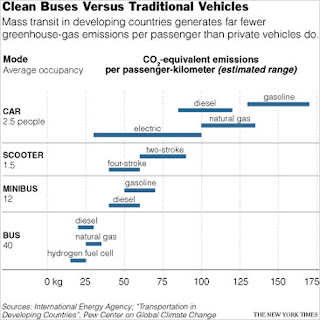It has also been claimed that such BRT systems may have a significant role to play in addressing the problem of greenhouse gas emissions by urban commuters. The Bogota BRT has become the first mass transport project in the world to be permitted to generate and sell carbon credits under the Kyoto Protocol. The relative CO2 emissions of different modes of transit are shown below.

BRT systems are upto 30 times cheaper per mile than underground rail systems and moves more passengers per mile every hour than almost any of the world’s subways. The Bogoto local authorities implemented the BRT in conjuction with other policies like removing one-third of its street parking to make room for TransMilenio, imposed alternate-day driving restrictions determined by license plate numbers to force car owners onto the system, and free shuttle buses to carry residents from outlying districts to TransMilenio terminals. See a slide show on the TransMilenio here.
No comments:
Post a Comment